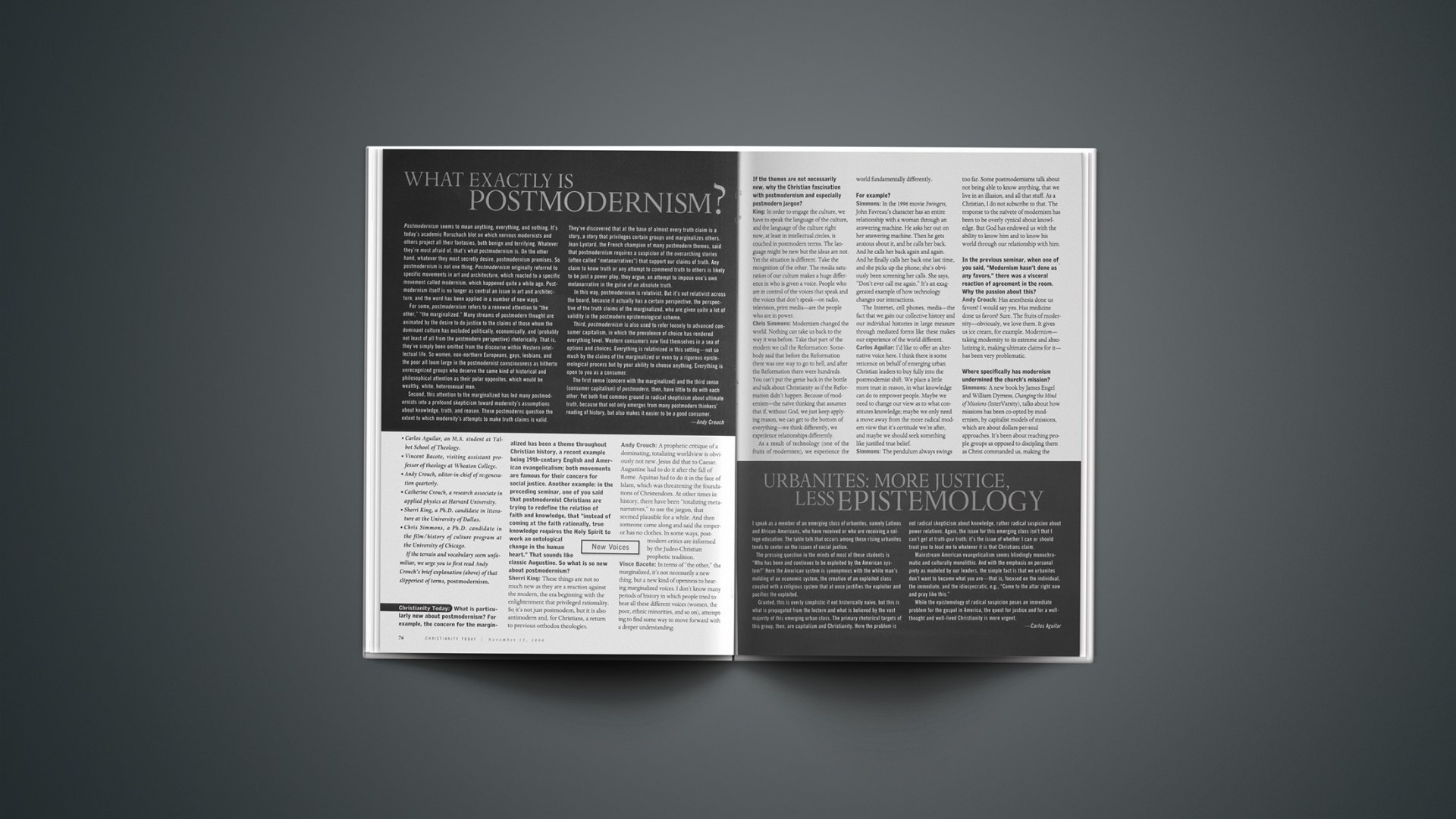Postmodernism seems to mean anything, everything, and nothing. It’s today’s academic Rorschach blot on which nervous modernists and others project all their fantasies, both benign and terrifying. Whatever they’re most afraid of, that’s what postmodernism is. On the other hand, whatever they most secretly desire, postmodernism promises. So postmodernism is not one thing. Postmodernism originally referred to specific movements in art and architecture, which reacted to a specific movement called modernism, which happened quite a while ago. Postmodernism itself is no longer as central an issue in art and architecture, and the word has been applied in a number of new ways.
For some, postmodernism refers to a renewed attention to “the other,” “the marginalized.” Many streams of postmodern thought are animated by the desire to do justice to the claims of those whom the dominant culture has excluded politically, economically, and (probably not least of all from the postmodern perspective) rhetorically. That is, they’ve simply been omitted from the discourse within Western intellectual life. So women, non-northern Europeans, gays, lesbians, and the poor all loom large in the postmodernist consciousness as hitherto unrecognized groups who deserve the same kind of historical and philosophical attention as their polar opposites, which would be wealthy, white, heterosexual men.
Second, this attention to the marginalized has led many postmodernists into a profound skepticism toward modernity’s assumptions about knowledge, truth, and reason. These postmoderns question the extent to which modernity’s attempts to make truth claims is valid. They’ve discovered that at the base of almost every truth claim is a story, a story that privileges certain groups and marginalizes others. Jean Lyotard, the French champion of many postmodern themes, said that postmodernism requires a suspicion of the overarching stories (often called “metanarratives”) that support our claims of truth. Any claim to know truth or any attempt to commend truth to others is likely to be just a power play, they argue, an attempt to impose one’s own metanarrative in the guise of an absolute truth.
In this way, postmodernism is relativist. But it’s not relativist across the board, because it actually has a certain perspective, the perspective of the truth claims of the marginalized, who are given quite a lot of validity in the postmodern epistemological scheme.
Third, postmodernism is also used to refer loosely to advanced consumer capitalism, in which the prevalence of choice has rendered everything level. Western consumers now find themselves in a sea of options and choices. Everything is relativized in this setting—not so much by the claims of the marginalized or even by a rigorous epistemological process but by your ability to choose anything. Everything is open to you as a consumer.
The first sense (concern with the marginalized) and the third sense (consumer capitalism) of postmodern, then, have little to do with each other. Yet both find common ground in radical skepticism about ultimate truth, because that not only emerges from many postmodern thinkers’ reading of history, but also makes it easier to be a good consumer.
Related Elsewhere
This article is a sidebar to the story, “The Anti-Moderns | Six postmodern Christians discuss the possibilities and limits of postmodernism.” See our other related stories in this package, “Urbanites: More Justice, Less Epistemology | The emerging urban class is targeting capitalism and Christianity—often for good reason” and “Scientists: Just Leave Us Alone | Not all the academy is so taken with postmodernism.”
Andy Crouch is editor-in-chief of re:generation quarterly. Until June 2000 he was a campus minister with InterVarsity Christian Fellowship at Harvard University. Listen to some of Andy’s Crouch’s talks given to the Harvard and Radcliffe’s IVC Fellowship.
Copyright © 2000 Christianity Today. Click for reprint information.










